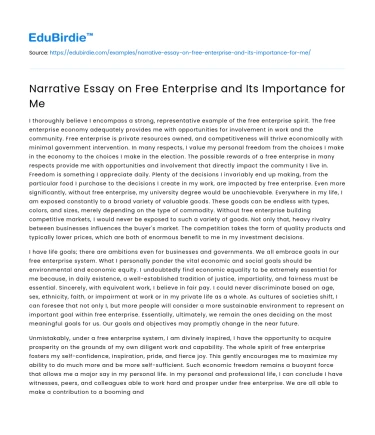Introduction
The concept of free enterprise is a fundamental pillar of modern economic systems, representing a dynamic interplay between individual initiative, market forces, and governmental regulation. This system, characterized by minimal state intervention, empowers individuals to pursue entrepreneurial endeavors, thereby fostering innovation, competition, and economic growth. The significance of free enterprise extends beyond macroeconomic indicators; it is a crucial driver of personal and professional development. As someone who has witnessed the transformative power of free enterprise firsthand, I can attest to its importance in shaping my career trajectory and worldview. In this essay, I will explore how free enterprise has influenced my life, drawing on specific examples and real-life cases, while also addressing counter-arguments to present a balanced perspective.
Economic Empowerment Through Free Enterprise
Free enterprise has been instrumental in providing me with the economic empowerment necessary to achieve my personal and professional goals. By facilitating an environment where ideas can flourish without undue interference, this system allows individuals to capitalize on their creativity and diligence. For instance, the tech industry serves as a prime example of free enterprise at work; entrepreneurs like Steve Jobs and Elon Musk have harnessed their innovative visions to create products that revolutionize the way we live and work. In my own experience, free enterprise has given me the opportunity to launch a startup, enabling me to transform an abstract idea into a tangible business model.
Save your time!
We can take care of your essay
- Proper editing and formatting
- Free revision, title page, and bibliography
- Flexible prices and money-back guarantee
According to economist Milton Friedman, "The great virtue of a free market system is that it does not care what color people are; it cares only whether they can produce something you want to buy." This quote encapsulates the essence of free enterprise, highlighting its role in breaking down barriers and democratizing economic access. By providing a level playing field, free enterprise empowers individuals from diverse backgrounds to participate in the economic arena, fostering a culture of inclusivity and meritocracy.
However, critics argue that free enterprise can exacerbate income inequality and lead to market monopolies. While these concerns are valid, it is essential to recognize that free enterprise, when coupled with sensible regulation, can mitigate such issues. Governmental oversight can ensure fair competition and prevent the abuse of market power, thereby preserving the integrity of the system. By striking a balance between freedom and regulation, free enterprise can continue to serve as a catalyst for economic empowerment and personal growth.
Innovation and Personal Growth
The spirit of innovation that permeates free enterprise has been a significant force in my personal growth. By encouraging experimentation and risk-taking, this system has allowed me to develop key entrepreneurial skills, such as problem-solving, adaptability, and resilience. In a rapidly changing world, these skills are invaluable, enabling individuals to navigate uncertainty and seize new opportunities.
A notable example of innovation-driven personal growth is the story of Sara Blakely, the founder of Spanx. Her journey from selling fax machines to becoming a self-made billionaire exemplifies the transformative power of free enterprise. By identifying a gap in the market and taking calculated risks, Blakely was able to create a product that resonated with consumers, ultimately redefining an entire industry. Her success underscores the potential for personal and professional growth within a free enterprise system.
Nevertheless, some critics contend that the focus on innovation can lead to a culture of short-termism, where companies prioritize immediate gains over sustainable development. While this is a legitimate concern, it is crucial to recognize that free enterprise also fosters long-term thinking by rewarding those who can adapt to changing market conditions. By encouraging continuous learning and development, free enterprise equips individuals with the tools needed to thrive in an ever-evolving landscape.
Conclusion
In conclusion, free enterprise is a vital component of modern economic systems, offering individuals the opportunity to achieve economic empowerment, personal growth, and innovation. By fostering a culture of inclusivity and meritocracy, free enterprise enables individuals from diverse backgrounds to contribute to the economic landscape, driving progress and prosperity. While there are valid concerns regarding the potential drawbacks of free enterprise, such as income inequality and short-termism, these issues can be addressed through sensible regulation and a balanced approach.
For me, the significance of free enterprise lies in its ability to transform abstract ideas into tangible realities, providing a platform for personal and professional development. By embracing the principles of free enterprise, individuals can navigate the challenges of a rapidly changing world, harnessing their creativity and initiative to create lasting impact. As we continue to grapple with the complexities of the global economy, it is essential to recognize the enduring importance of free enterprise in shaping our lives and futures.






 Stuck on your essay?
Stuck on your essay?

